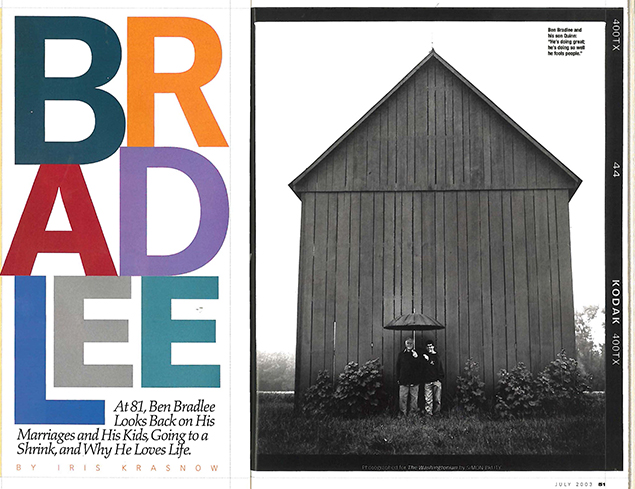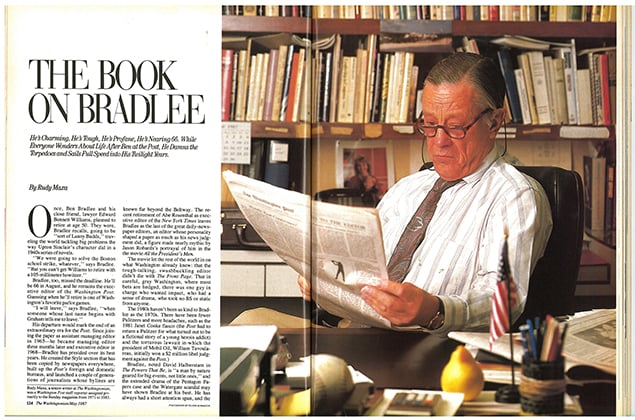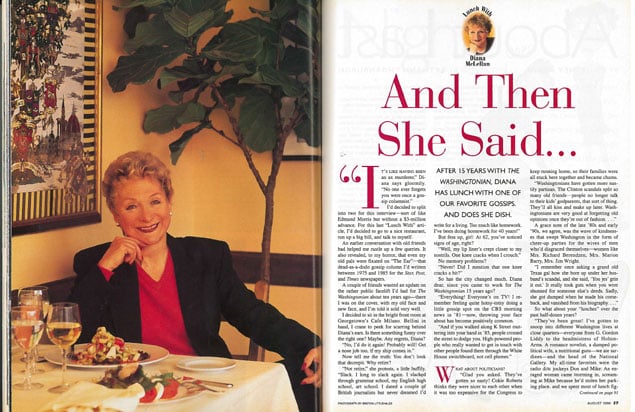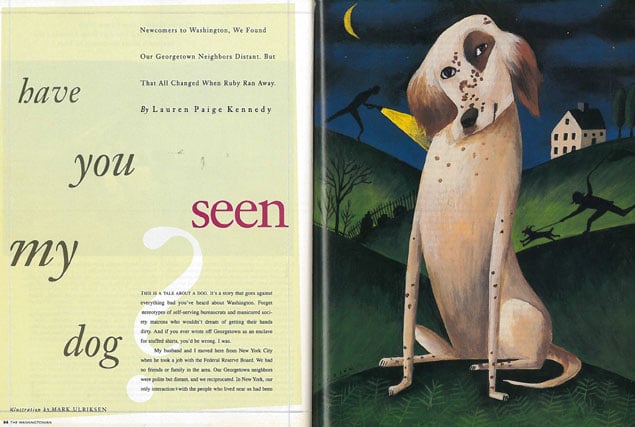He is a former President of the United States, but the welcome mat is seldom out for him here in Washington.
His own party treats him as if he were an awful embarrassment, like an alcoholic uncle to be hidden in the attic when company arrives.
He is the subject of ridicule wherever he goes, and the mere mention of his name brings derisive laughter.
Richard Nixon?
No.
Jimmy Carter.
Four years after his departure from the White House, Carter remains the thirteenth guest at the national dinner table. Throughout the presidential campaign, about the only time anything was heard from him was when President Reagan gave him a kick in the shins—by implying that he was responsible for an intelligence failure that led to the September embassy bombing in Beirut.
The man from Plains emerged just long enough to cry foul, calling Reagan’s remarks “personally insulting” and “gross.” Reagan, falling back on his usual—and erroneous—alibi that the press had distorted what he had said, phoned Carter and offered an “explanation.” It was not an apology, the White House emphasized. Who needs to apologize to Jimmy Carter?
• • •
Not that Jimmy Carter was the forgotten man of the 1984 presidential campaign. Far from it. He was a heavy albatross around the neck of Walter Mondale. “The Carter connection,” it was called, and everybody knew what the phrase meant—the political equivalent of having slept with somebody with herpes.
Why?
Some will say it is because Carter was inept. He could not control rising inflation and interest rates, and that is true. But he was victimized by soaring international oil prices, and failing to control the economy has been a shortcoming of many Presidents—hardly akin to, say, the crimes of Watergate.
Others will say it is because he was weak. He could not, extricate the 52 American hostages who were held in Tehran for fourteen months and were only released—in a conspicuous display of contempt for him—at the very moment his power as President was passing to his successor. But they did come home alive, unlike the 260 Americans who perished in three Beirut bombings with Reagan at the helm.
Still others will say it was because he had no style, that he talked funny. But he clearly is a man of intelligence, and while he wasn’t a very good television President, he was personable and effective when dealing face to face with people.
Jody Powell, Carter’s White House press secretary and now a newspaper columnist, says the continuing negative feeling about Carter is a hangover from two years ”that left many unpleasant memories and tastes in people’s mouths. When you’re sitting in the catbird seat, and something bad happens on your watch, you’re gonna get the blame for it”—even if, as in the energy crisis of the time, it’s not your fault.
The same is true, Powell says, of the hostage situation, which occurred when “there was more of a hunger for the United States to belt somebody in the nose than ordinarily.” Had Carter ”made some sort of military move that ended the thing,” he speculates, “even if it killed everyone there and he then retaliated, he probably would have been in much better shape.” Powell says he has discussed that notion with some of the hostages and even they agree.
• • •
If Ronald Reagan has enjoyed a Teflon presidency, Jimmy Carter’s was of the flypaper variety—everything negative seemed to stick to him, and still does. At the same time, he appears to get no credit for a personal foreign-policy triumph—the Camp David accords between Egypt and Israel—and other successes, including the sticky Panama Canal treaties and normalization of relations with the People’s Republic of China. Reagan has not approached any of these achievements in foreign policy—unless you count his successful invasion of Grenada.
Powell cites the American public’s reaction to Grenada as confirmation of that “hunger” for something that could be called a victory. And he wryly observes, “Would to God our hostages had been held in Grenada.”
Another Georgia alumnus of the Carter administration now living here, media consultant Gerald Rafshoon, deplores the different standards that seem to apply to Carter and Reagan. He notes that Reagan’s comparison of the security failure in the second Beirut bombing to the problems of getting your kitchen remodeled seemed not to hurt him. “But,” Rafshoon says, “look at what the killer rabbit did to Carter.”
Rafshoon says he can just see what the cartoonists would have done had Carter used the kitchen-remodeling example: ”They would have had Jimmy Carter in an apron, saying, ‘Lawdy, when y’all gonna fix mah kitchen?'”
Not only the Republicans have made an easy mark of Carter, Rafshoon notes. “He’s a convenient scapegoat for Democrats still around,” he says, “and he hasn’t enough currency in the bank with them, which was his problem here when he was President.” Rafshoon recalls Senator John Glenn’s campaign reference to ”the failed, disastrous policies of the past” to slow the rush to Carter’s Vice President in late 1983.
• • •
When Carter spoke at the Democratic National Convention in July, his onetime adversary for the 1976 nomination, Representative Morris Udall of Arizona, tried to remind their party of some of the good things the former President had done, and to cajole them into giving him a suitable reception.
Udall could have saved his breath. When Carter appeared on the convention platform, he got the kind of polite applause given to a faded movie queen. For his own part, Carter demonstrated at once one reason fellow Democrats are so cool to him—his lack of style or an engaging sense of humor.
Remembering the line by Reagan in their 1980 debate that had painted Carter as a nag—”There you go again”—Carter began his speech by saying, “Here I go again! And I’m still talking about the same things: about economic and military security, about peace backed by American defense forces but derived from diplomacy and statesmanship, about simple human justice and basic human rights. I’m here to affirm these fundamental values once more …. “
The opening crack went over like a lead balloon. And as for Jimmy Carter as a worker in the vineyard to elect Mondale, the convention clearly wished he’d taken his labors elsewhere. Indeed, the convention schedule, overseen by the Mondale campaign, had Carter being hustled on and off the rostrum before television coverage began. Only the insistence of old Carter crony Bert Lance, temporarily elevated to the general chairmanship of the campaign, allowed Carter to have a crack at a larger television audience.
Carter was able to generate cheers from the convention crowd only when, one by one, he named each of the eight Democrats who had contested for the presidential nomination and when he referred to the nomination of Geraldine Ferraro as the first woman to be a vice-presidential candidate from a major party.
Since then, the only time Carter attracted attention was right after Labor Day, when he rode a bus from Georgia to New York City with fellow Christians to spend a week renovating a Lower East Side Manhattan tenement. And for this gesture of charity and good will, what he got mostly was incredulity.
What is so ironic about the dumping on Jimmy Carter is that it is going on at a time when the man forced out of the White House as a crook, Richard Nixon, is enjoying a political resurrection.
While it is true that the Republicans have not yet gone so far as to invite Nixon to their national convention, President Reagan conferred in secret with him in New York prior to his October meeting with Soviet Foreign Minister Andrei Gromyko. And Nixon was invited by and received a standing ovation from the American Society of Newspaper Editors at its convention in Washington in May. It was like the hooded executioner taking off his black mask and giving the hanged man a kiss on the lips. But that seems to be the way of it with Nixon, a man who knows no shame and is almost admired for it.
When the voters of California thought that they had ended Nixon’s political career by defeating him for the state’s governorship in 1962, he told them bitterly that they wouldn’t “have Nixon to kick around anymore.”
Now, 22 years later and with plenty of added reason to give him the boot, some of the nation’s top editors have been treating him with unbelievable deference. And Carter, who did not have to be pardoned after leaving office to make sure he stayed out of prison, is the one who is getting kicked around.
For all the ridicule Carter has taken, he has been remarkably quiet in the face of events. In his farewell address to the nation, six days before leaving office, Carter listed three paramount areas of concern: “the threat of nuclear destruction, our stewardship of the physical resources of the planet, and the pre-eminence of the basic rights of human beings.” Reagan’s foot-dragging on nuclear-arms control, his weak environmental-protection record, and his insensitivity to human-rights outrages in Central America hear witness that those Carter concerns were well founded.
But in his first year back as a private citizen, Carter pretty much held his tongue. Having been in the White House, he understood the need to give a new President time to get settled. “I have a sense of generosity on time,” he told UPI’s Helen Thomas in March 1981, two months after he left office. “I think every administration has to feel its way forward.” He did lobby Democratic leaders in Congress to oppose some of the Reagan budget cuts that year, but he kept busy writing his memoirs, making plans for his presidential library in Atlanta, and visiting China and Japan.
It was Carter’s fate that the one matter that drew the most attention to him that first year out of the Oval Office was the report in Diana McLellan’s “Ear” column then appearing in the Washington Post that Blair House had been “bugged” prior to Reagan’s inauguration, enabling the Carters to eavesdrop on the Reagans. The Carters threatened to sue the Post until publisher Donald E. Graham wrote them a letter retracting the item and apologizing.
Carter’s memoirs, Keeping Faith, came out in the fall of 1982. They were widely viewed as self-serving, although Carter had vowed the book would not be an apology. In his customary way, Carter burned the midnight oil on the book, writing it himself on a home computer. He told us it was the hardest task he had ever tackled.
He finally started attacking Reagan’s policies in late 1982, but he never got much credit from his fellow Democrats, who continued to regard any association with him as a political kiss of death. Carter faced this reality with surprising equanimity. In November 1982 he came here flacking his book and at a breakfast meeting with reporters observed of Mondale, his preferred candidate for 1984: “Obviously, Fritz in his political wisdom wants to separate himself from me.” That was understandable enough, Carter said, because “there’s a lot of baggage that goes with my own administration.” Kicking Carter is so easy because he seems to accept it as his natural fate.
• • •
Carter was not always like that. As candidate and President he had a penchant, for all his professions of brotherly love, for kicking the other guy, especially when he was down. There was the time during the 1976 primaries when Hubert Humphrey decided not to challenge him for the nomination. Carter said he was “disappointed that he decided not to run”—because he would have whipped him. And four years later, when Ted Kennedy was considering challenging Carter for the Democratic nomination, Carter told a group of Democratic congressmen at the White House dinner: “I’ll whip his ass.”
A contributing factor to the scope of Carter’s defeat by Reagan probably was ”the meanness issue”—the way he turned so heavy-handed against Reagan, when he said the election would “help decide whether we have war or peace,” or when he said later, “whether Americans might be separated, black from white, Jew from Christian, North from South, rural from urban.”
It may be that Carter’s biggest problem was that he was an outsider in an insiders’ town , and that he has never really been one of tile boys. His attorney general and old Atlanta friend, Griffin Bell, wrote in his own book with Ronald Ostrow, Taking Care of the Law, that ”the United States—and certainly Jimmy Carter—would have been better off if the President had put his feet up on the railing from time to time, taken a drink and chatted with a few friends of broad experience and mature judgment.”
Hamilton Jordan, Carter’s White House chief of staff, says he is not surprised that his old boss continues to be a whipping boy in Washington. “We didn’t have many defenders while we were in the White House,” he says now, “and it stands to reason that when we left we wouldn’t have any more. We were outsiders. We had defeated the congressional favorites.” Jordan cites a political aide’s study of the first six months of the Carter administration indicating that 75 percent of the public criticism the new President got was attributed to fellow Democrats.
Ronald Reagan, however, was just as much an outsider to Washington as Carter was and continued, as Carter did, to try to run the government as an outsider. But he came into town appreciating the value of jollying the troops and has never stopped. Even House Speaker Tip O’Neill will testify to Reagan’s talents as a raconteur.
• • •
There are those, too, who contend that Carter’s troubles stem from an unusually hostile press. A political-science professor at Fairfield University in Connecticut conducted a study that professes to show that Carter received the worst press of any President ever. The academic, Professor John Orman, checked the Readers’ Guide to Periodical Literature from 1900 through 1982 to measure what he called “valenced” reporting (in magazines only) on all the American Presidents in that period. Valenced reporting, he says in his paper, “means stories that add to or subtract from the macho presidential-leadership image.” In other words, boosts and knocks.
What the professor did was read the titles—the headlines—of every article concerning a President appearing in a periodical over those 83 years and decide whether the title—not necessarily the content—was pro, con, or neutral toward the President involved. He found that Carter was the only twentieth-century President to come out with a net negative score, and that for a 46-month stretch—all but two months of his tenure—there were more negative titles than positive.
Writing in Presidential Studies Quarterly last summer, Orman observed that the negative reporting on Carter has continued. “The Carter image has become one of a loser, a wimp, a weakling, an incompetent, a bumbler, a corrupt man, and one of the worst Presidents of all time.” And they say a headline only gives you the essence of a story.
Orman went on: “Carter was not involved in any criminal conspiracy to obstruct justice as Richard Nixon was, and Carter was not involved in any immoral war efforts like the war in Indochina, yet his negative press was more than Johnson received for Vietnam, Nixon received for Watergate, or Hoover received for the Depression. In terms of frequency of negative stories, Carter was clearly not given a fair shake by the periodical press. His only ‘crime’ was that he did not live up to early media expectations in an era where investigative journalism had gone wild in the post-Watergate euphoria. ”
• • •
Maybe in time Jimmy Carter will receive the same absolution that Richard Nixon appears to be getting right now. Hamilton Jordan notes that in the early 1950s Harry Truman took more than his share of barbs and ridicule but that he was appreciated in time. “I don’t know if Carter will ever enjoy a revival of that dimension,” he says, “but I do think people will regard him higher as time goes on.”
For the forseeable future, however, Carter seems destined to be the guy who sends everybody fleeing to the far end of the bar the minute he enters the saloon. It’s almost as if he had been Vice President.
This article appears in the December 1984 issue of The Washingtonian.

















